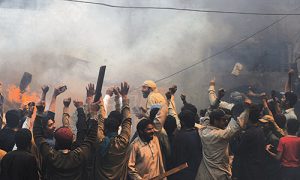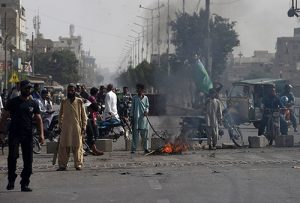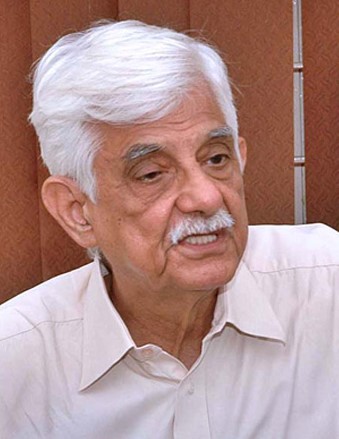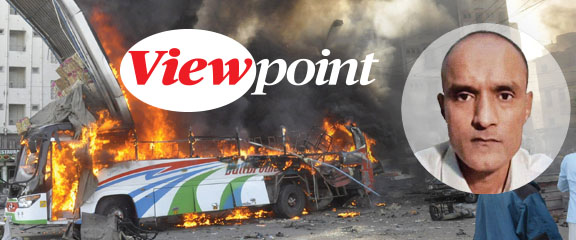Like most every society across the globe, we too are a class-based society. However, the economic gap between the classes here is more pronounced than in other societies. And the inevitable resultant acrimony between the rich and poor is of a much higher degree than that in most other societies.
For the last several decades the State of Pakistan has gradually been withdrawing from its primary duties of eliminating hunger, disease and illiteracy. Government budgets are mostly spent in the elite areas. NGOs with their very meagre resources are not able to fill the gap between the real needs of the people and the services provided. As a consequence, the poor and the lower-middle classes have almost given up on the State.
The miserable conditions in which the deprived classes are forced to live give rise to anger and revolt. The State finds novel ways to divert the focus of these classes from the ground reality of their unbridled exploitation at the hands of the very few. It plays on their emotions. Hollow slogans are invented that are divisive in essence. The political movements that ensue rely on exploiting sectarian, ethnic and racial prejudices. Hatred against exploitation and the cries of the oppressed for prosperity, justice and peace are successfully diverted to fragment society further and for building a power base for the corrupt and unscrupulous. We have repeatedly seen that such movements are violent in nature and the resulting casualties provide more fuel to raise the levels of violence.
If we examine the Taliban, the MQM or the recent TLP movements in Pakistan, we will find that their entire manpower has come from the poor and lower-middle classes. Their respective leaderships have sometimes emerged from within the movement, but at times are planted by the State in the shape of agent provocateurs. Funds and weapons to them are provided by these very patrons or contributed by adherents, or are simply extorted by their militant wings. Hatred-based insecurity further fragments society and one feels safer in herding together with those who have similar religious beliefs or ethnicity. The leadership of such groups never goes to those elements who think rationally, abhor violence and desire peace.

When Jam Sadiq Ali made a government in Sindh with the support of the MQM, my father wondered why it was so easy for scoundrels of different ethnicities to unite and almost impossible for rational and good people of different ethnicities to get together and bury this evil. Gaps had certainly been created which have since given the rogue elements space to step in.
Perhaps the same has happened with religion. The absence of a progressive interpretation of religion and our allergy to science and mathematics have created voids and the previously marginalised mullah now occupies the midstream of our national life.
I recall that in 1968 when the fundamentalists started shouting that Islam was in danger, Shaheed Zulfikar Ali Bhutto said that in a country where 97 per cent of the people were Muslims there was no battle between Islam and kufr. The real battle was between the exploiters and the exploited — and both were Muslims. Responding to the propaganda that Socialism was against Islam he said that Islam enjoined equality and socialism was the scientific way to create equality. When 300 mullahs signed a fatwa that socialists were kafirs, Bhutto asked where the other 200 were because 500 mullahs had signed the fatwa of kufr against Imam Husain (A.S.) before the tragedy of Karbala.
In the political movement against the Ayub dictatorship, while all the right-wing political parties had gathered on the DAC (Democratic Action Committee) platform and were making all kinds of offers to Shaheed Bhutto to join that platform, he opted to fight the Ayub dictatorship from the newly formed PPP platform. In reply to a question as to why he was not joining the DAC he simply said that he had nothing to do with parties that had no programme for the rights of the downtrodden.
The flow of time and history is towards the future. The past can never be given a fresh birth. Prejudices, injustice, deprivation and other such anti-people negative trends tend to block the onward flow of time and history. But such blocks are temporary in their very nature. Just like water starts collecting in the shape of a pool when its flow is blocked artificially, human anger starts accumulating when the onward flow of time and history is blocked by force. And just like the pools of water which start to stagnate over a period of time when the flow of water is blocked by artificial means, so too human anger starts expressing itself in many harmful and self-defeating manifestations when the flow of time and history is blocked.

But artificial blocks cannot sustain. Sooner or later the dams burst because they cannot withhold the energies that have accumulated behind them. This bursting of the dams can engender various disasters, among them, the submerging of low-lying habitations. The wise anticipate the time of the bursting of dams, and they endeavour to divert the flood waters into channels that will rejuvenate dead farmlands and bring prosperity instead of destruction.
New energies are being released. The challenge before us is to divert these energies in the long lost channels of time and history that had run dry because of the stoppage of the flow. There is despondency all around us. The oppressed have started losing faith in their future and in the future of their country. Their anger is growing with the deterioration in their conditions. The loss of hope and their emotional state facilitates unscrupulous leaders and agent provocateurs to make them rise against the State on meaningless issues that have nothing to do with their well-being.
The manipulators who are playing the game of fragmenting our society on meaningless fault lines ignore the fact that the State, which had earlier abandoned its social duties towards the underprivileged, is fast losing its authority and coercive powers. We keep shouting about the writ of the State but are seeing almost on a daily basis that the smallest groups can bring the administration to its knees when they come out in protest.
More than a decade ago, the late Rasul Bux Palijo told me that the time for being clever was long past. He said “those who try to be clever shall fall on their face.” This is what we are now experiencing almost every day. Some still try to be clever, but they stand exposed and fall on their face.
Our democratic struggle has taken the political consciousness of the common citizen to a very high level. This consciousness is irreversible. Our womenfolk, oppressed for centuries, have stepped out and are taking their destiny in their own hands. This political consciousness and the stepping out of our girls are our greatest strengths against exploiters and oppressors. The challenge for the wise at this moment is to channelise these strengths into positive pro-people programmes. Our failure to do so can only result in anarchy and destruction.

The writer is a Senator and a founding member of the Pakistan Peoples’ Party.



